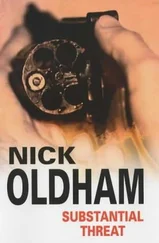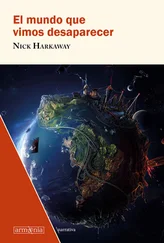‘You must come, Lester,’ Inoue had said. ‘You must come! We will cry for this place, but also we will dance the Funky Chicken.’ And she had actually demonstrated, to his delight and the absolute bewilderment of her interns. The Sergeant was not always at ease with scientists, but Inoue was different. She was graceful and she made him feel at home in his skin. She was joyful, and from time to time she painted her fingernails in bright bubblegum colours.
Twenty-two weeks after she delivered her initial report, a new Cloud was belched up by the island and a freak of weather carried it over the sea to the east. Two thousand in the Maldives were stricken with a blight which caused temporary blindness and tinted the skin green with chlorophyll. Governments convened. The chasm must be cleansed. Quite obviously, they told the avid press room, it was dangerous. Should the symbiotic bugs spread into the oceans, the world might rapidly become unfit for human life. Or something might emerge from Mancreu’s gullet which ate plastic, or silicon, or devoured crude oil, and the bases of industrial civilisation might perish. If the mountain went quiet for a few months, that just meant it was biding its time.
A new classification for the crisis was formulated. Mancreu was made the first ever UNO-WHO Interventional Sacrifice Zone, a place so wretchedly polluted that it must be sterilised by fire. In acknowledgement of the people of the island and their proud heritage and culture, the execution was deferred pending a final assessment. In the meantime, Mancreu became a kind of Casablanca, possessed of an uncertain legal status by virtue of the sentence of death, expropriated from its notional sovereign by the international will, gladly yielded up to its doom, yet still there and officially claimed by no one.
Then the Black Fleet gathered, and the process of sterilisation remained on hold.
On hold, like the Sergeant himself, who had arrived some time later and should by now have gone home. Well, he was in no hurry. In the night of Brighton House, he listened to the sound of the tomatoes beyond the glass. In amongst them somewhere there was a creature, probably a feral cat. He watched the moon trace its path across the sky and realised that the chill was seeping into him. His feet and lower legs were cold, and so was his nose. He felt a brief, tiny rumble in the ground, as if the island were a dog dreaming of rabbits. The windows rattled, and then it was over. A three-pointer, if that.
Abruptly, he wanted to be back in bed, and when he lay down the mattress was somehow a perfect fit.
THERE WAS WHITE chalk on the telegraph poles the next morning, times and places scrawled one under another. The Sergeant winced as he peered through his window. He wondered who it would be. Beauville families, for sure. A few farmers giving up the ghost. People he knew to nod at. People he had helped, or got drunk with. Children he had lifted up from scuffed knees. Probably a few adults he had arrested and would be glad to see go, but mostly the inevitable winnowing was taking the honest middle, leaving the listless and the feckless, the very good and the very bad. He wondered if he would need to be more and more of a policeman as time went by, if his time on Mancreu would grow more busy and more unpleasant as things gathered pace. Although when would that happen? He had already been here longer than anyone had thought possible. If Mancreu was a potential extinction event — and that was what they had called it in the Security Council — then humanity was being very relaxed about fighting it.
Well. There were things he could do. From the beach to the mountains, at least, he could be the small, necessary face of the law. He was even somewhat equipped for his investigative duties by a six-day course in public order and detection from the Metropolitan Police Service, attended in preparation for his stint in Basra. The course had been intense and rather depressing because the instructors knew and the students knew that the entire job was moribund from the outset, a token gesture towards a civil society the occupying powers could not and would not impose. But on Mancreu, it was enough. Most cases he had come across were simple enough that — if they could not be solved purely by turning up — a little thought and some legwork yielded results. He had discovered a small affinity for asking the right questions. He leaned heavily on the parting advice of his instructor, Detective Inspector Burroughs:
‘You grind the facts as best you can, but after that it’s about putting yourself in the way of people,’ Burroughs had told him, in a brief, quiet moment. ‘If you just get out in the river and stand there long enough, you end up with fish in your trousers and everyone thinks you’re a genius.’
Since arriving on the island he had dealt with some thefts and some basic assaults, one killing — in self-defence, though that had been far from clear at the outset — and a host of odd, minor disputes which technically were more the province of a magistrate than a policeman. The only really intractable puzzle had been a break-in at the Xenobiology Centre in which nothing was stolen except some of Dr Inoue’s notes and a selection of inexpensive desktop toys from Japan. He had initially assumed a journalistic motive, but since there had been no great splash of scientific scandal he had come to the conclusion that it had been the work of a vagrant looking for food. The notes were a draft which had been sitting on Inoue’s desk, she said, and eminently replaceable. The Sergeant pictured pages of graphs stuffed into a tattered coat to keep out the south wind. The toys. . he couldn’t find a use for. A crime of opportunity, then, which was copper-speak for no bloody idea. Burroughs would have shaken his head: ‘Lester, when you find yourself blaming a tramp because the crime makes no sense and tramps are known to be mad, you’re nowhere.’
The Sergeant’s neck twinged. He had woken with a stiffness in his shoulders and his head was full of the night’s dreams, which had been bitter. Someone had told him once that the act of moving is what erases our memory of dreams: if you wish to remember, you must make a conscious effort to consider each image with the waking mind before so much as sitting up.
He, evidently, was wired differently, or perhaps he had brooded an instant too long before swinging his legs down onto the mat at his bedside, because the recollection was easy and even insistent.
He had dreamed that he held his wife in his arms. The sweetness of it was painful. She was tallish and strong and she smelled of London in the summer rain, of cream teas in Cornwall and of oil paint in his uncle’s studio. Her hair was in front of her face and somehow whatever he did he never quite spoke her name, although he knew it, he was sure.
They danced. He had never been comfortable with modern dancing, had told her so early in their marriage, and she had agreed to learn ballroom. They had discovered they liked it and now they were very good, floating across the pale wood of a mirrored salon over a French restaurant in King’s Cross. Waltzing, the way a soldier and his missus should.
It went wrong before the song ended. It was abruptly his sad duty to inform her of his own death. He was a ghost, his body cooling far away, his spirit embodied just for this, either a blessing or a vile cruelty.
‘I’ve crossed over,’ he said, ‘that’s what I’m here to tell you. You’ll be all right. You will. Take care of the kids and promise me you won’t hang about when you’re ready, not on my account. You do what you do and I’ll be smiling, and remember I’m waiting for you.’ He couldn’t believe he was saying these things. Euphemisms and platitudes he had always despised. Crossed over. Gone on. Passed away. All crap. The word was ‘dead’ and it didn’t mean any kind of good, not ever, not for anyone.
Читать дальше
Конец ознакомительного отрывка
Купить книгу











